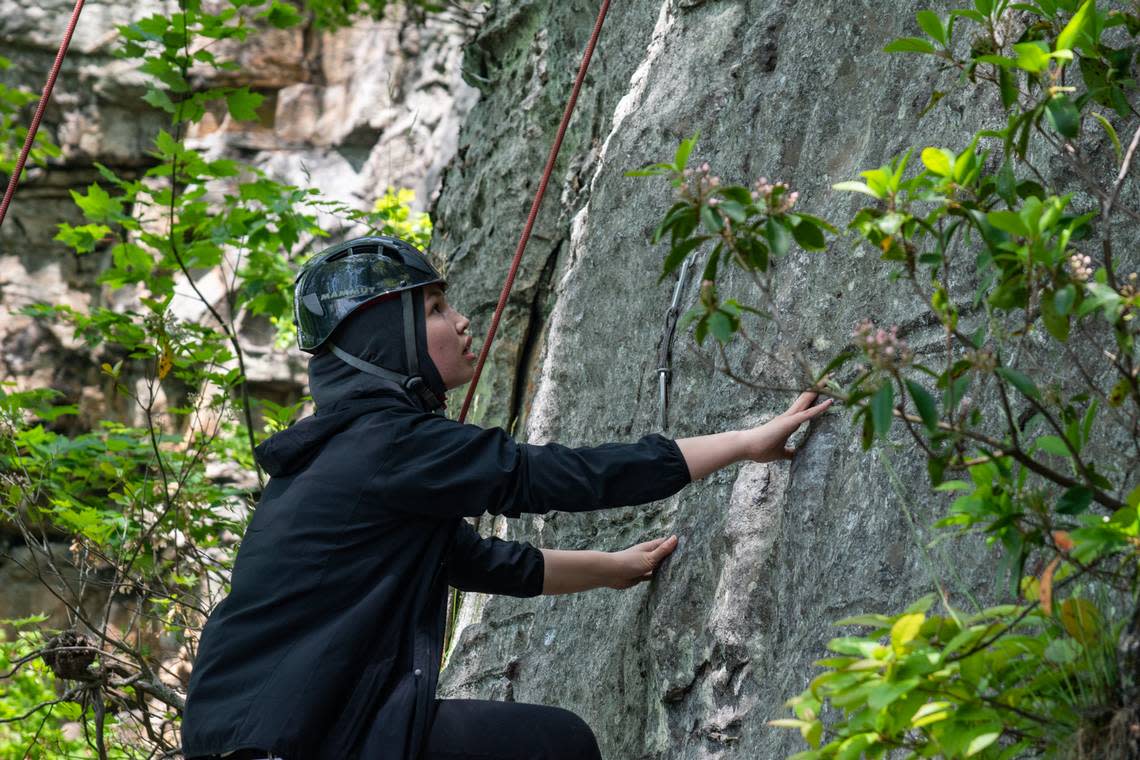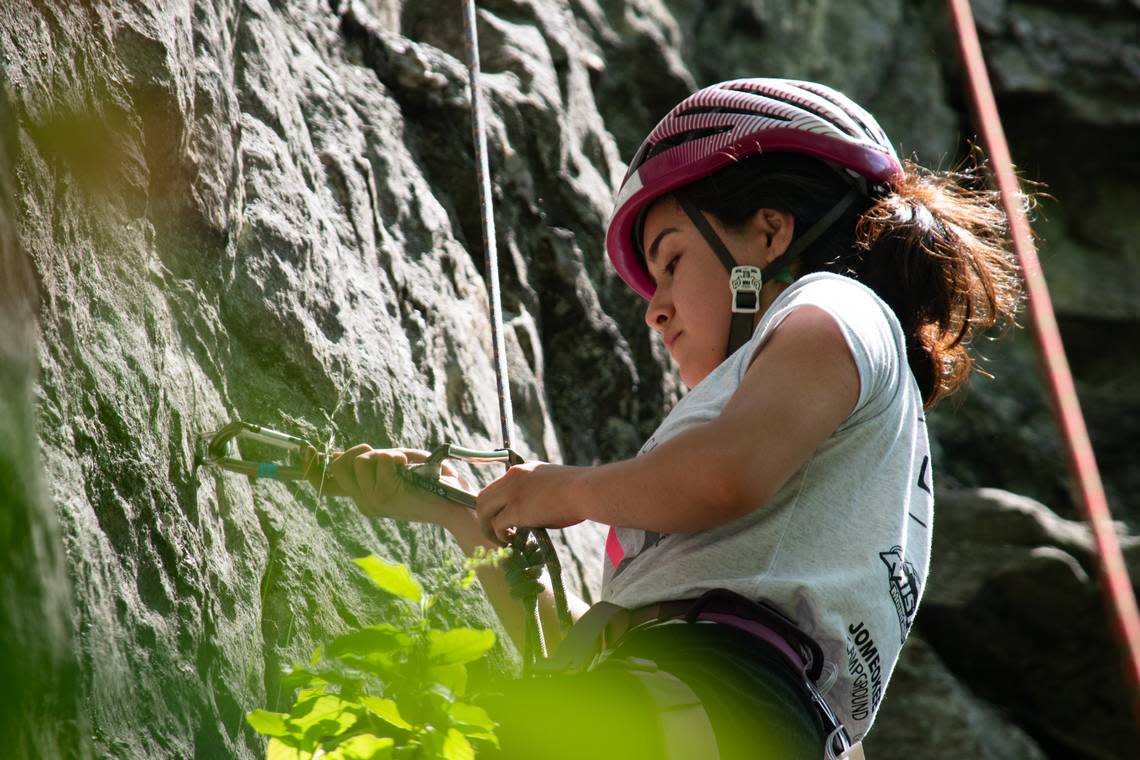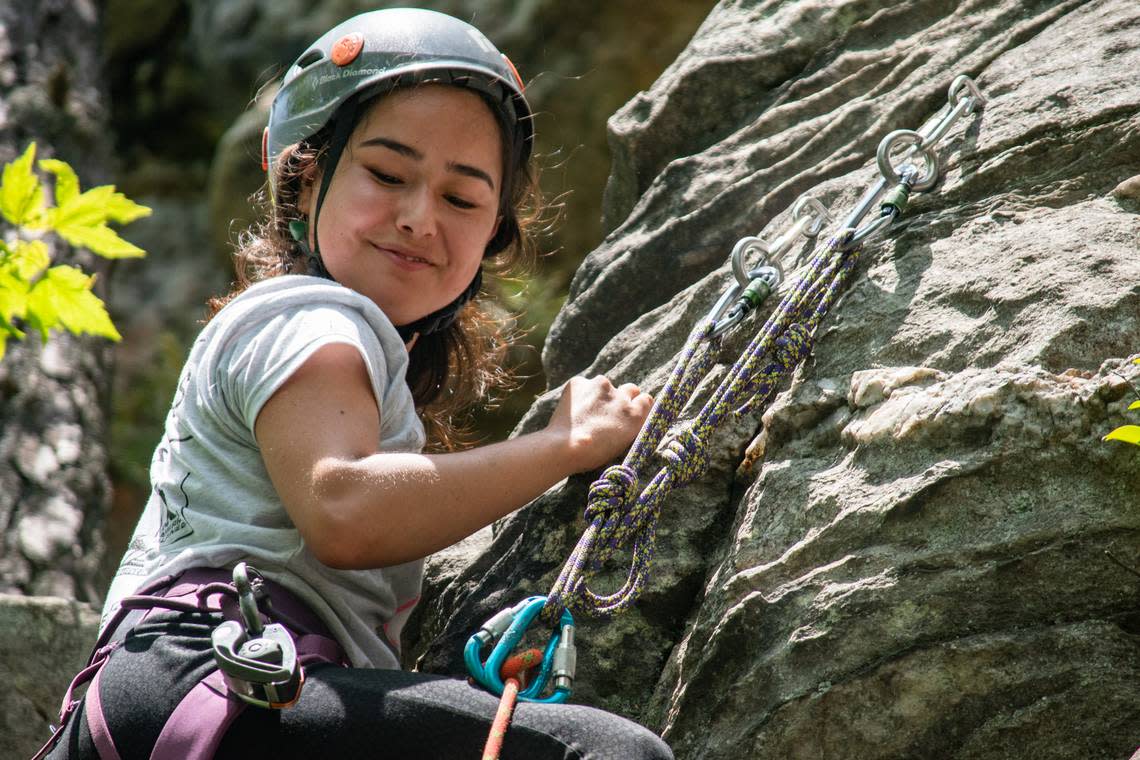How a group of Afghan women found a home in NC’s rock climbing community
Just past one o’clock on a cloudy May day, a hauntingly inviting voice sang from Sughra Yazdani’s phone. It was the Islamic call for the Zuhr, or midday prayer, playing from an app on her phone.
“Allahu Akbar, Allahu Akbar,” the voice called, competing with the oak trees rustling in the breeze in the Fear of Flying climbing area at Pilot Mountain State Park, north of Winston-Salem. “God is the greatest, God is the greatest.”

Yazdani, who is Muslim, was there for a rock climbing festival with her friends Mina Bakhshi and Raihana Ahmady and Ahmady’s brother Mansoor. They were chaperoned by their hosts and rock climbing mentors, Ashton Drew of Durham and Anne McLaughlin and her husband Tom of Raleigh.
The group met through Ascend: Leadership Through Athletics, a nonprofit that helps young Afghan women through the sport of climbing.
Yazdani, Bakhshi and the Ahmady siblings fled Taliban-controlled Afghanistan in September and arrived in the United States around Christmas last year.
In Afghanistan, their involvement with Ascend provided a figurative escape from the civil unrest and threats to women’s rights from Taliban forces. But it became literal once they no longer felt safe in their own home and the group offered them a way out.
Empowered
In a magenta helmet and a purple harness fastened around her hips, Bakhshi nimbly traversed three of the climbing routes on the rock wall — elevation: 2,056 feet. McLaughlin spotted her from below with a rope, known as belaying in the rock climbing world.

Back on solid ground, and after catching her breath, she nibbled on some trail mix, drank several gulps of water and let down her hair she had ponytailed to climb. Then she sat on a rock slab a few feet from the rest of the group to talk about her home back in Afghanistan.
Bakhshi is from Dara Ajdahar, or Dragon Valley, a small village in the Bamyan province, about 112 miles northwest of the capital city Kabul. The region is a popular destination for rock and ice climbers alike because of its rocky mountain ranges and their icy peaks.
As a child, the 20-year-old says, she didn’t really know who the Taliban were. She was born after the U.S. military invasion of Afghanistan in 2001 to bring down the extremist Islamic group’s regime.
“Bamyan used to be one of the safest provinces,” she said. “I really feel lucky that I at least spent my childhood in a safe environment.”
She grew more aware of the Taliban as a teen when its forces began taking back Afghan territory and launched armed attacks in the 2010s, including against people of her Hazara ethnicity.
The Hazara are a large ethnic group who have long faced persecution and discrimination, especially from the Taliban and the Islamic State. Most Hazaras have historically practiced Shi’a Islam, while the majority of Afghans — including the Taliban and ISIS — practice Sunni Islam.
Bakhshi’s province is part of the region known as Hazarajat, or “land of the Hazara,” according to human rights group Minority Rights Group International. She describes her community as tight-knit and progressive by traditional Afghan standards.
“[Hazaras] are very educated,” Bakhshi said. “They’re very supportive of their girls and just … everyone! And I think that’s the reason why Taliban target Hazaras — Taliban and IS — because they’re working to, you know, eliminate this gender discrimination.”
The most recent terror attacks against Hazaras and Shi’a Muslims happened earlier this month.
On Aug. 5, eight people were killed and 18 injured in a blast in Kabul claimed by the Islamic State, according to Reuters. The next day a bomb exploded in a busy shopping street in Kabul, killing eight people and injuring at least 22, also claimed by IS.
Over the last few decades, in response to being persecuted, many Hazara leaders have emerged and started progressive movements for women’s rights, education and freedom of speech.
Ascend was founded in 2014 also to “empower girls through high quality, high impact sports-based leadership training,” like climbing.
Bakhshi first learned about rock climbing in her high school English class in Afghanistan in 2020. The teacher shared an article about Japanese climber Junko Tabei, who in 1975 became the first woman to climb Mount Everest. Two months later, she says, an Ascend staffer visited her class to recruit new members.
“I just applied for it and I went through, like, the whole process and was interviewed,” she said. “Then, I got into the team!”

She went on many climbing trips across Afghanistan with members from other cities, something she said gave them a glimpse beyond the horizon and filled them with physical and emotional strength.
“It was like a dream for me,” Bakhshi said. “I was just thinking about it. Dreaming about it. I didn’t know that I could get the dream, you know? Like I could reach to that point.”
“I think more people in NC should learn about this progressive voice in Afghanistan and how many of them are now our neighbors,” McLaughlin, who is an Ascend volunteer in the Triangle, told The News & Observer. “Their families are still back there, suffering.”
The Taliban take over
Bakhshi remembers reading her planner on Aug. 14, 2021. She had just turned 19.
“I had my plans for the 15th ... you know, like for the whole week,” she said. “And then on the 15th, everything was wrong.”
The U.S.-backed Afghan government fell to Taliban forces, and the extremist group took over the country.
Her world collapsed.
That became the first of the 15 days Bakhshi and her family spent on lockdown, as others across the country rushed to the airports and attempted to flee.
“That was a very depressing situation. I really don’t remember myself. You know?” she said. “The worst days of my life.”
All Bakhshi could think of was how her future might change under Taliban rule: Would she still be able to climb? Go to college? Would she be allowed to dress how she wanted?
The Taliban vowed to protect women’s rights “within the framework of Islamic law,” but many were skeptical. Bakhshi included.
With every passing day, Taliban military presence increased and the August 31 deadline for U.S. forces to withdraw neared. The strength and aspiration she always felt while climbing seemed to have crumbled, leaving her resigned to her fate.
“Maybe I’m supposed to, like, live my whole life this way,” she remembers telling herself.
“I was devastated,” she said. “I couldn’t believe what was happening.”
But the call she got at 11:30 p.m. on August 31 was even harder to believe.
‘Last chance’
The voice on the other line was a man from Texas she had never met.
“Pack your everything in five minutes,” she says he told her. “And go to the address I’m giving you.”
Bakhshi was stunned.
Who was this man and how did he find her? What was she supposed to do?
Because so many people were trying to evacuate Afghanistan, Bakhshi says there were scams going around offering to help people flee for money.
She and her parents were concerned. Even more so when the man told her she couldn’t bring her family and had to go alone.
But just like the fear she had to overcome on her first climb, Bakhshi pushed through.
“This is my last chance; I cannot lose that,” she remembers telling her parents and the man on the phone. “I’ll do whatever it takes.”
She packed a bag and, reluctantly, her parents sent her off.
First she took a bus to Kabul and from there took another north to the city of Mazār near the border with Uzbekistan. The Taliban blocked all flights from departing airports, so she and the others fleeing spent 21 days in hiding across the city.
They were finally able to fly out of Mazār to Qatar on September 21.
“Everyone on the plane … they were crying,” she said. “I couldn’t stop my tears.”
Bakhshi questioned her decision to leave, but she says her mother assured her it was the right one.
“My mom really said very powerful words and told me, … ‘What if you had stayed in Afghanistan?’” she said. “‘Girls now, they are not allowed to go to school, they’re not allowed to go to university, they have to cover their face. Do you want the same for you? You don’t deserve it; you deserve better.’”
She spent 35 days at a U.S. military base in Qatar waiting for her humanitarian parole status to be cleared. It’s a unique and temporary immigration status for people who need to urgently leave their country for safety or medical reasons but do not qualify for other forms of asylum or refugee status. Broadly, it means they are not guaranteed refugee or asylee benefits like a work permit once they are here.
Once her status was approved, Bakhshi was sent to the Joint Base McGuire-Dix-Lakehurst in New Jersey where Afghans were temporarily housed before being resettled in other states. It’s also where she was reunited with her Ascend teammates Yazdani and Ahmady.
Nearly three months later, late in December, Bakhshi was welcomed by McLaughlin in Raleigh, and another Ascend member there took in the Ahmady siblings. Yazdani would live with a friend of Drew’s in Durham.
‘Mentally, I’m still there’
While grateful, Bakhshi misses her family. Her home.
She’s able to speak with them regularly via WhatsApp to make sure they are safe and tells them about her hiking adventures. But she says it isn’t the same, and sometimes she feels guilty about her freedom.
“I’m living somewhere, like, that is peaceful. No conflict. No war,” she said. “But mentally, I’m still there.”
Yazdani’s favorite climbing experience was actually in Bakhshi’s hometown back in 2019.
“It was actually ice climbing,” she said. “That year we had ice in Afghanistan, so we went there. And I think that was a fun trip. And I really enjoyed it. And I can remember it.”
Living in North Carolina, the women are members of the Triangle Rock Club and practice regularly around their part-time jobs.
They also go on trips across the country. Recently, the outerwear brand Patagonia sponsored their climbing trip to Yosemite National Park with other former members of Ascend who have resettled in the United States.
Yazdani will be attending George Washington University in D.C. on a partial scholarship.
“In August, I’ll be going to university,” she said. “I’m going to [major in] business.”
With the help of Drew and McLaughlin, Bakhshi and Ahmady, who worked as a civil engineer in Afghanistan, are applying for college, even though their immigration status could be a barrier.
“I’m one of those who is hesitant about my career a little bit,” Bakhshi said. “But I have a couple of options, and journalism is one of the things I’m really interested in.”
Bakhshi and the Ahmady siblings will be moving into an apartment to live on their own for the first time this month.
Roughly 1,720 Afghans have resettled across North Carolina since August 2021, according to a N.C. Department of Health and Human Services spokesperson. That’s over a third more than the department initially projected (1,169) shortly after U.S. forces withdrew from Afghanistan.
A “vast majority” of these newcomers, like the climbers, are humanitarian parolees.
They have no idea how long they’ll be allowed to stay, but it’s a steep climb they’ll inevitably have to conquer.
If you would like to financially help these Ascend alumni resettle in North Carolina, Friends of Ascend - Triangle (North Carolina) is raising money via GoFundMe.
